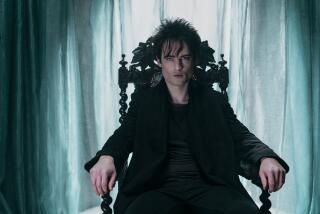Theodore Sturgeon; Noted Science Fiction Writer
- Share via
Theodore Sturgeon, a prolific science fiction writer credited with humanizing that genre at a time when it was obsessed primarily with wars between worlds, died Wednesday in a Eugene, Ore., hospital.
Sturgeon was 67 when he died at Sacred Heart Hospital, where an attending physician would say only that death was attributed to natural causes.
Jim Frankel of Sturgeon’s publisher, Bluejay Books, said the author had been suffering from lung ailments.
“He was an influence on most of us science fiction and fantasy writers,” said Ray Bradbury, who wrote the introduction to the first of Sturgeon’s nearly 30 books, “Without Sorcery,” in 1948.
The stepson of a university professor who established a daily compulsory reading program for his new son, Sturgeon became instead an indifferent student, and with his brother spent free time devouring the pulp adventure stories popular in the 1930s.
His stepfather next enrolled him at a Pennsylvania nautical school but instead of studying, Sturgeon went to sea as a laborer. It was during that subsequent three-year period that he first began to write.
By 1939, he was contributing articles to Unknown, a New York-based magazine that published stories of the supernatural and whose editor, John W. Campbell, was publishing and encouraging such future giants of science fiction writing as Robert A. Heinlein and Isaac Asimov.
In 1941, he published “Microcosmic God,” a tale of an inventor who creates a race of small creatures that quickly become more advanced than their propagator. It was his first popular success.
He eked out a living writing throughout the 1940s, and in 1952, published “More Than Human,” considered the best of his novels. It was hailed, reported the “Dictionary of Literary Biography,” for its “discovery of an ethical sense which will insure not merely its benevolence but its survival.” It was awarded the International Fantasy Award.
Sturgeon brought a stream-of-consciousness technique to his characters, and his writings were compared to those of William Faulkner and James Joyce, although Sturgeon’s troubled souls were found in far-flung worlds.
Some critics found him a forerunner of the New Wave generation, with his emphasis on the alienation, loneliness and eventual self-discovery of adolescents.
He also painted word portraits of women struggling for a sense of self, when few male authors were at work in that field. Homosexuals and other sexual minorities were also part of his novels and stories.
Other books by Sturgeon include “Venus Plus X,” “Some of Your Blood” and “The Dreaming Jewels.” Among his last was “The Golden Helix” in 1980.
In 1966-67 the television series “Star Trek” produced two of his scripts, “Shore Leave” and “Amok Time.” In 1970 he won both the Hugo and Nebula (science fiction) awards for his short story “Slow Sculpture.”
More to Read
Sign up for our Book Club newsletter
Get the latest news, events and more from the Los Angeles Times Book Club, and help us get L.A. reading and talking.
You may occasionally receive promotional content from the Los Angeles Times.






